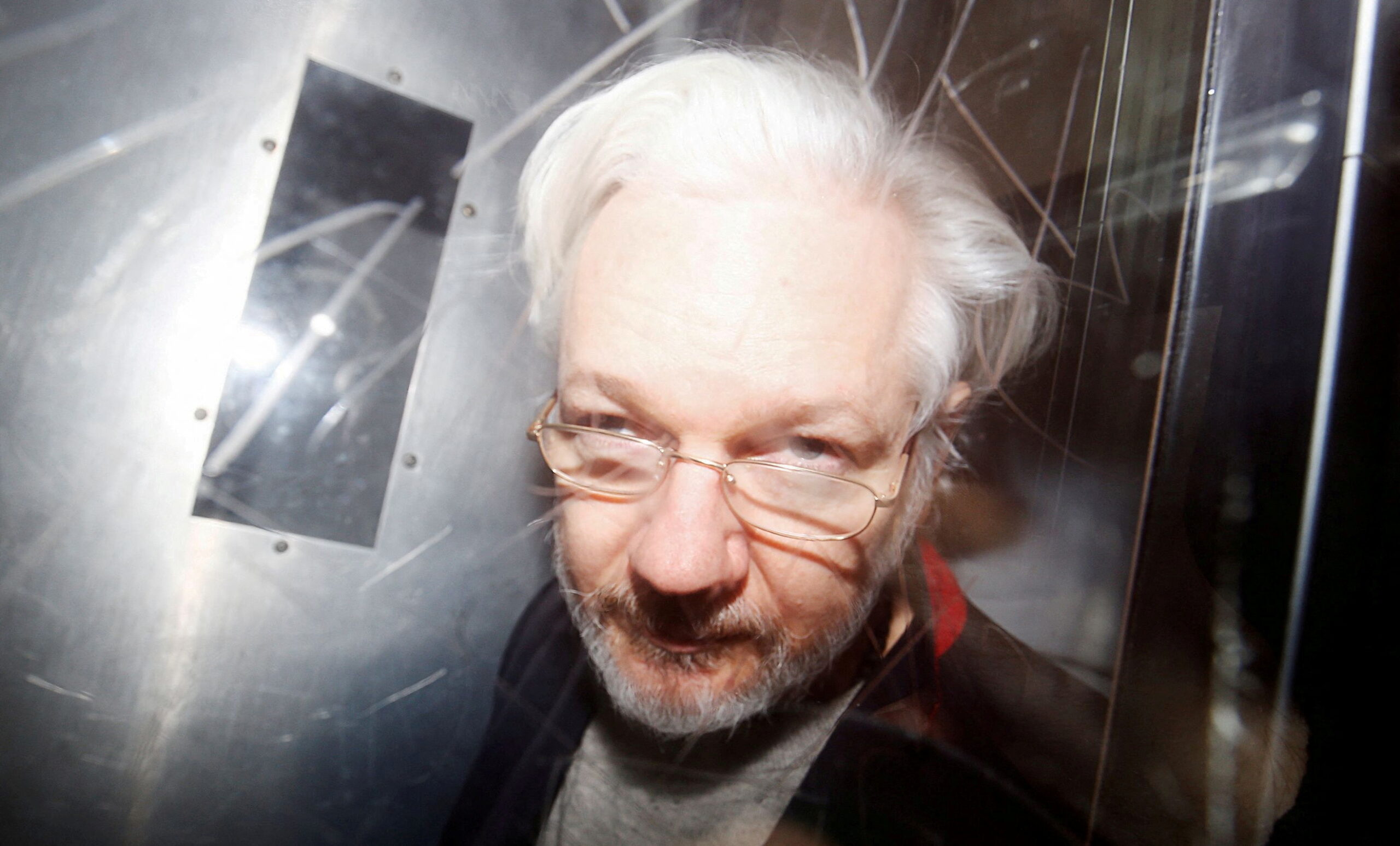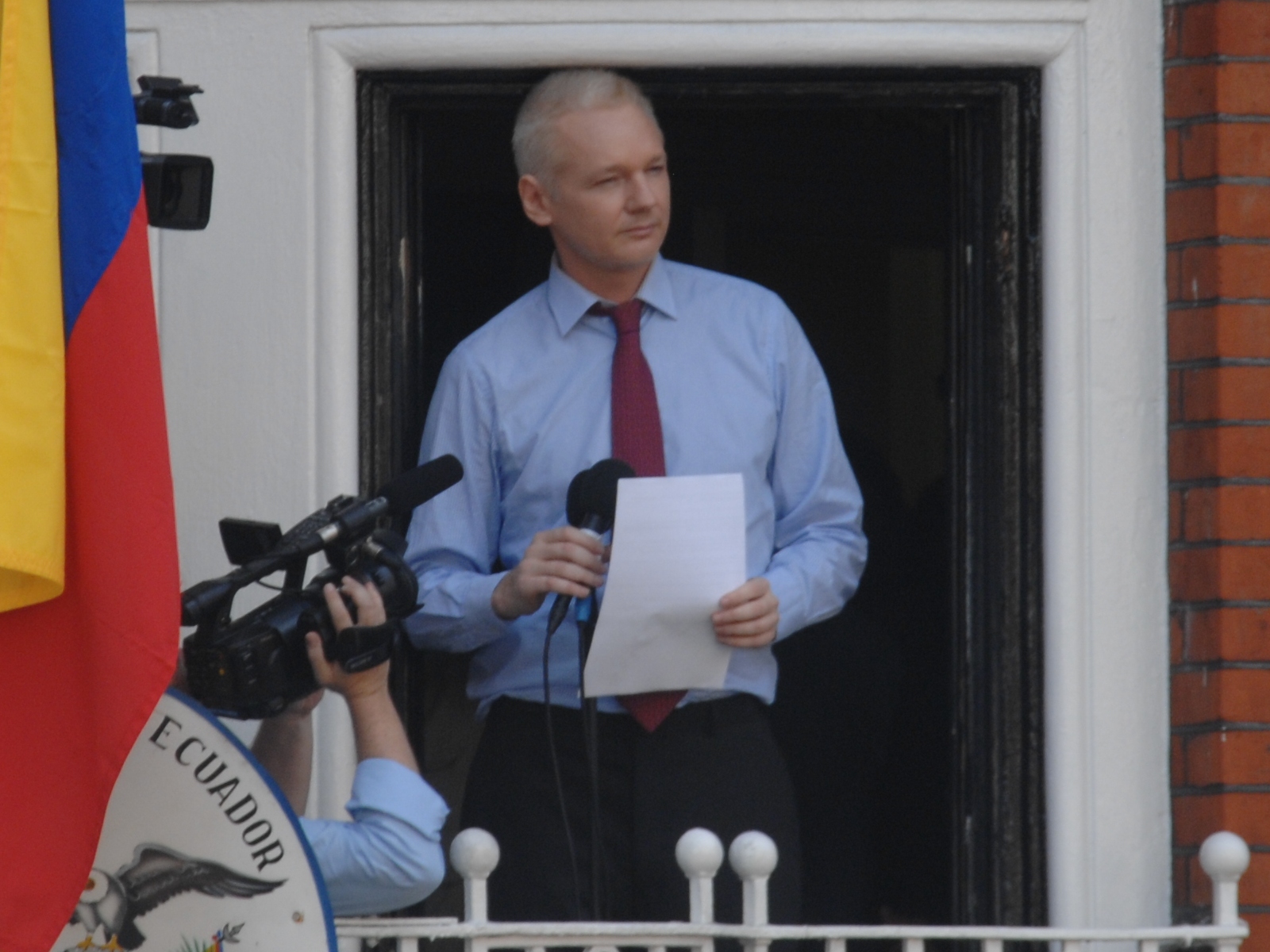The Newseum Institute’s First Amendment expert, Gene Policinski, originally published this commentary on June 13, 2019, on the Newseum blog, and has given First Amendment Watch permission to reprint.
For the latest news on the indictment of Julian Assange, click on the box below.
For an in depth examination of WikiLeaks’ history and legal cases, click on the box below.
First Amendment Watch Deep Dive
Two First Amendment alarms are sounding in the wake of new federal charges against WikiLeaks founder Julian Assange, but only one is being heard by most of us — for now.
Initially, federal prosecutors charged Assange with just one crime: conspiring in 2010 with former Army Private Chelsea Manning to hack a government computer password, which allowed Manning access to a trove of classified information that she turned over to WikiLeaks.
For weeks, free press advocates worried that the Department of Justice would go beyond prosecuting Assange for computer hacking and expand the charges into journalists’ territory —publishing classified information.
These fears were not unfounded. On May 23, the unsealing of an 18-count indictment under the 1917 Espionage Act, accusing Assange of working directly with Manning to obtain secret government documents, set off Alarm #1 for most journalists. The new charges implicate the work of journalists, which often involves talking with sources and at times possessing and publishing secret documents.
In trying to thread a legal needle, Justice Department lawyers said the Assange indictment avoids a collision with the First Amendment because he is not a journalist, as they define the profession.
And therein is Alarm #2: the government defining who is and who is not a journalist. This was the very activity that the nation’s founders — who had first-hand experience with the abuses inherent in a system where the crown licensed printers and publishers — ruled out in 1791 by creating unequivocal First Amendment protection for a free press.
How did we get to these alarming places?
The broadly written Espionage Act criminalizes the taking, possession and distribution of government secrets by any unauthorized person for any reason. But federal officials through the years have acknowledged that the role of a free press historically has meant at times providing the public with information that government officials of the moment wanted to keep secret. For that reason, journalists in the U.S., particularly those reporting on national security issues, have operated for decades with the tacit acceptance that they would not be prosecuted for receiving illegally obtained information from a third party as long as there was no involvement by the journalists themselves in the actual taking of the information property.
So it mainly has been policy, not law, protecting journalists receiving stolen information related to national security. The law explicitly protects publishing that information since the 1971 Pentagon Papers decision in which a splintered U.S. Supreme Court said “prior restraint” by government to stop publication of secret materials was unconstitutional. Seen generally as a free press win, often left unsaid is that the justices left open the issue of what penalties the government could impose on journalists after publication of classified materials.
That’s why the Assange indictment, if it stands, could dramatically change the delicate balancing act that has existed until now, in which the government sought to protect its secrets by prosecuting leakers, but did not go after reporters and news outlets that produced news reports based on leaked materials.
In announcing the indictment, the Associated Press reported, justice officials said Assange was “not charged simply because he is a publisher,” but rather because he actively encouraged Manning to steal hundreds of thousands of secret documents related to U.S. military and diplomatic actions in Iraq, Afghanistan and elsewhere, cracking a password that gave Manning access to the materials and “publishing a narrow set of classified documents in which Assange also allegedly published the unredacted names of innocent people who risked their safety and freedom to provide information to the United States and its allies.”
In a telephone conference call with reporters, Assistant U.S. Attorney General John Demers said the indictment does not destroy the Department of Justice’s informal agreement not to pursue journalists for publishing leaked information, saying the department “… takes seriously the role of journalists in our democracy … Julian Assange is no journalist.”
Demers then ventured into the definition zone — triggering Alarm #2 — that the nation’s founders thought to exclude: “No responsible actor, journalist or otherwise, would purposely publish the name of individuals he or she knew to be confidential human sources in war zones, exposing them to the gravest of dangers.”
While the journalists I know would agree with that assessment, and Demers may well be sincere in his words, the important element is that such a statement must be journalism’s self-definition, not one provided by a government official or established by ordinance, edict or, in a backhanded fashion, through an indictment.
The nation’s founders knew all too well that what the government can grant, it can take away. The danger in allowing the Justice Department to expand its Assange indictment into “publishing” is that can hand current and future administrations a cover under which they may pursue, in instances of leaked secrets, those reporters they disfavor.
There is real debate among First Amendment advocates whether to recognize Assange and WikiLeaks as a non-traditional journalist/journalism or as a political activist and subversive enterprise hiding behind a false shield. The government does need to protect many secrets.
Congress could avoid touching off future alarms by writing into the 102-year old Espionage Act more specific language that reflects what it was really meant to target: Those who steal and reveal U.S. government secrets with the purpose of harming the nation and exposing its citizens to danger.
Surely such a revision could make a safe space for those whose goal is to help, not hurt, the public by relaying classified information that properly holds government accountable — and that aids and abets not crime, but self-governance.
Want a few examples? The Pentagon Papers’ history lesson, which showed how government hid its decades-long engagement in Vietnam. The revelations about the massive surveillance system that grew up in the early 2000s without Americans being aware their phone calls (and later, their email traffic) was being stored and parsed by a huge government program. The reports revealing that newly designed vehicles to protect soldiers from landmines in Iraq and Afghanistan were slow in reaching the front lines, even as dozens or more died needlessly. The list is much longer if you care to look.
In the process of revisiting that law and those stories, let’s also keep in mind the core First Amendment principle that we know journalism when we see, read or hear it, not when a government official tells us.
Gene Policinski is president and chief operating officer of the Freedom Forum Institute. He can be reached at gpolicinski@freedomforum.org, or follow him on Twitter at @genefac.
Tags




